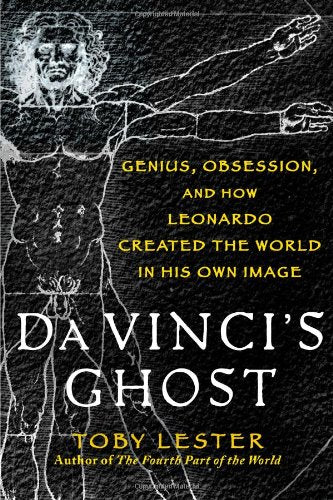Free Press
Da Vinci's Ghost: Genius, Obsession, and How Leonardo Created the World in His Own Image
Regular price
$9.95 USD
Regular price
Sale price
$9.95 USD
Unit price
per
Shipping calculated at checkout.
Couldn't load pickup availability
Title: Da Vinci's Ghost: Genius, Obsession, and How Leonardo Created the World in His Own Image
Author: Toby Lester
ISBN: 9781439189238
Publisher: Free Press
Published: 2012
Binding: Hardcover
Language: English
Publisher Description:
In Da Vinci's Ghost, critically acclaimed historian Toby Lester tells the story of the world's most iconic image, the Vitruvian Man, and sheds surprising new light on the artistry and scholarship of Leonardo da Vinci, one of history's most fascinating figures. Deftly weaving together art, architecture, history, theology, and much else, Da Vinci's Ghost is a first-rate intellectual enchantment."--Charles Mann, author of 1493 Da Vinci didn't summon Vitruvian Man out of thin air. He was inspired by the idea originally formulated by the Roman architect Vitruvius, who suggested that the human body could be made to fit inside a circle, long associated with the divine, and a square, related to the earthly and secular. To place a man inside those shapes was to imply that the human body could indeed be a blueprint for the workings of the universe. Da Vinci elevated Vitruvius' idea to exhilarating heights when he set out to do something unprecedented, if the human body truly reflected the cosmos, he reasoned, then studying its anatomy more thoroughly than had ever been attempted before--peering deep into body and soul--might grant him an almost godlike perspective on the makeup of the world. Written with the same narrative flair and intellectual sweep as Lester's award-winning first book, the "almost unbearably thrilling" (Simon Winchester) Fourth Part of the World, and beautifully illustrated with Da Vinci's drawings, Da Vinci's Ghost follows Da Vinci on his journey to understanding the secrets of the Vitruvian man. It captures a pivotal time in Western history when the Middle Ages were giving way to the Renaissance, when art, science, and philosophy were rapidly converging, and when it seemed possible that a single human being might embody--and even understand--the nature of the universe.
Author: Toby Lester
ISBN: 9781439189238
Publisher: Free Press
Published: 2012
Binding: Hardcover
Language: English
Publisher Description:
In Da Vinci's Ghost, critically acclaimed historian Toby Lester tells the story of the world's most iconic image, the Vitruvian Man, and sheds surprising new light on the artistry and scholarship of Leonardo da Vinci, one of history's most fascinating figures. Deftly weaving together art, architecture, history, theology, and much else, Da Vinci's Ghost is a first-rate intellectual enchantment."--Charles Mann, author of 1493 Da Vinci didn't summon Vitruvian Man out of thin air. He was inspired by the idea originally formulated by the Roman architect Vitruvius, who suggested that the human body could be made to fit inside a circle, long associated with the divine, and a square, related to the earthly and secular. To place a man inside those shapes was to imply that the human body could indeed be a blueprint for the workings of the universe. Da Vinci elevated Vitruvius' idea to exhilarating heights when he set out to do something unprecedented, if the human body truly reflected the cosmos, he reasoned, then studying its anatomy more thoroughly than had ever been attempted before--peering deep into body and soul--might grant him an almost godlike perspective on the makeup of the world. Written with the same narrative flair and intellectual sweep as Lester's award-winning first book, the "almost unbearably thrilling" (Simon Winchester) Fourth Part of the World, and beautifully illustrated with Da Vinci's drawings, Da Vinci's Ghost follows Da Vinci on his journey to understanding the secrets of the Vitruvian man. It captures a pivotal time in Western history when the Middle Ages were giving way to the Renaissance, when art, science, and philosophy were rapidly converging, and when it seemed possible that a single human being might embody--and even understand--the nature of the universe.

